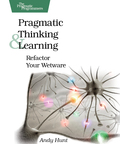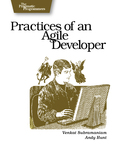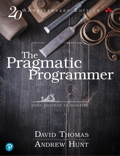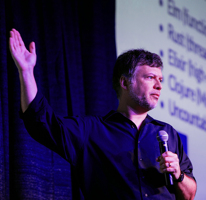Toolshed Technologies
Andy Hunt
Author, Programmer, Musician
MacBook Air and Iterative Development
01/18/2008
There’s been a lot of whining about the MacBook Air that loses sight of it’s real purpose—and no, I’m not talking about the road warrior audience.
As you probably heard, Apple announced a new super-skinny laptop at this year’s MacWorld expo. Named the MacBook Air, it’s impressively skinny and light-weight, and a few features that move in interesting and new directions:
- No wired internet, wireless only
- Multi-touch trackpad
- Optional 64GB solid state hard drive
The “wireless only” is a natural evolution; with initiatives such as Sprint’s upcoming Xohm service the age of ubiquitous WiFi is just about here. Wired is so 90’s.
The multi-touch ability is a clear progression from the interface on the existing iPhone and iPod Touch devices, but with a twist. Instead of the direct manipulation touch interface you experience on the pocket devices, you’re confined to using the traditional trackpad. It’s not part of the screen.
Then there’s the allure of the solid-state drive. No mechanical wear-and-tear (great for a portable), better battery life (no motors to spin up), and I’m guessing pretty blindingly fast speed. But that’s a hefty $999USD option.
So why did Apple bother to make this Air laptop? It’s an iteration. A middle step from the existing product line to the next.
What we really want is a tablet. Full screen multi-touch, with a large and affordable solid state drive, always connected at broadband speeds, with hassle-free backup over the air. We’re not there yet.
But there are enough road warriors who will probably buy the Air to help drive down production costs for the new bits: the new smaller die Intel chip, perhaps, as well as the solid state drive and whatever other new-fangled goodies they’ve got inside. So you make an interim product such as the Air: it will have it’s audience, and that will pave (and pay) the way for the next iteration. Gives you a chance to work out the bugs, spot new opportunities, see how people use it. That’s what an iteration is all about.
We expect our software customers to embrace iterative development, with increasing features and incremental improvement from one release to the next. Yet I hear a lot of whining about the Air that it’s not perfect, that it’s not what people want, that you’re better off with a MacBook Pro, etc.
It’s an iteration. As with any product, take the pragmatic approach: if it meets your needs now, buy it. If you’re looking at possible future needs, then wait.
And maybe think about what an iteration is all about: feedback.





Latest News
-
New article: The Limits of Process
January 25, 2022 -
New article: Habits vs. Practices
January 5, 2022 -
New novel: Weatherly Hall
August 10, 2021 - List All News...



